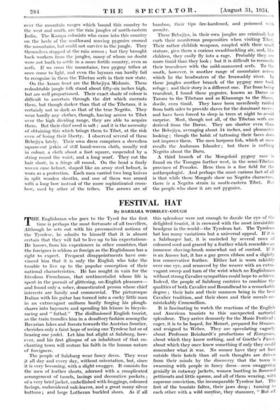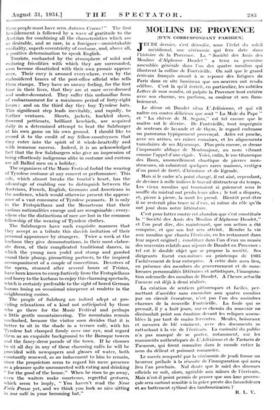FESTIVAL HAT
By BARBARA WORSLEY-GOUGH
THE Englishman who goes to the Tyrol for the first time is perhaps the most fortunate of all travellers. Although he sets out with his preconceived notions of the Tyrolese, he admits to himself that it is almost certain that they will fail to live up to his expectations. He knows, from his experiences in other countries, that the foreigner is seldom as foreign as the Englishman has a right to expect. Frequent disappointments have con- vinced him that it is only the English who take the trouble to live up to the popular conception of their national characteristics. He has sought in vain for the frivolous Frenchman, that sentimentalist whose life is spent in the pursuit of glittering, un-English pleasures— and found only a sober, domesticated person whose chief interests are family and commercial. The picturesque Italian with his guitar has turned into a cocky little man in an extravagant uniform busily forging his plough- shares into bayonets and spending his leisure in bicycle- racing and " futbal." The disillusioned English tourist, as the train trundles him in a desultory fashion among the Bavarian lakes and forests towards the Austrian frontier, cherishes only a faint hope of seeing one Tyrolese hat or of hearing one yodel. Let him but alight at Salzburg, how- ever, and his first glimpse of an inhabitant of that en- chanting town will restore his faith in the human nature of foreigners.
The people of Salzburg wear fancy dress. They wear it all day and every day, without ostentation, but, since it is very becoming, with a slight swagger. It consists for the men of leather shorts, adorned with a complicated arrangement of tassels, lacings and decorative pockets ; of a very brief jacket, embellished with froggings, coloured facings, embroidered oak-leaves, and a great many silver buttons ; and large Lutheran buckled shoes. As if all this splendour were not enough to dazzle the eye of the delighted tourist, it is crowned with the most irresistible headgear in the world—the Tyrolean hat. The Tyrolean hat has many variations but a universal appeal. If it is a Salzburger hat, it is encircled by several rows of coloured cord and graced by a feather which resembles an immense shaving-brush somewhat out of control. If it is an Aussee hat, it has a gay green ribbon and a slightly less conservative feather. Either hat is worn rakishly over one eye, and removed by the wearer with an extra- vagant sweep and turn of the wrist which no Englishman without strong Cavalier sympathies could hope to achieve. Indeed, the people of Salzburg contrive to combine the qualities of both Cavalier and Roundhead to a remarkable degree ; their hats and their manners being in the best Cavalier tradition, and their shoes and their morals un- mistakably Cromwellian.
It is fascinating to watch the reactions of the English and American tourists to this unexpected sartorial splendour. They arrive demurely for the Music Festival ; eager, it is to be hoped, for Mozart, prepared for Strauss, and resigned to Weber. They are speculating vaguely about Professor Reinhardt's productions of Everynian, about which they know nothing, and of Goethe's Faust, about which they once knew something if only they could remember what it was. No sooner have they set foot outside their hotels than all such thoughts are driven from their minds by the discovery that the town is swarming with people in fancy dress—men swaggering genially in cutaway jackets, women bustling in flowered petticoats and little aprons, and all of them wearing, with supreme conviction, the incomparable Tyrolese hat. The feet of the tourists falter, their jaws drop ; turning to each other with a wild surnlise, they stammer, " But an these people must have seen Autumn Crocus!" The first bewilderment is followed by a wave of gratitude to the Austrian for combining all the characteristics which are so desirable, and so rare, in a foreigner—unmistakable cordiality, superb eccentricity of costume, and, above all, a positive determination to speak English.
Tourists, enchanted by the atmosphere of solid and enduring frivolities with which they are surrounded, soon become dissatisfied with their own prosaic appear- ance. Their envy is aroused everywhere, even by the embroidered braces of the post-office official who sells them stamps. They have an uneasy feeling, for the first time in their lives, that they are at once over-dressed and under-decorated. They suffer this unfamiliar form of embarrassment for a maximum period of forty-eight hours : and on the third day they buy Tyrolese hats. This significant step leads inevitably, and rapidly, to further ventures. Shorts, jackets, buckled shoes, flowered petticoats, brilliant kerchiefs, are acquired daily in a determined attempt to beat the Salzburger at his own game on his own ground. I should like to record it to the credit of my fellow-countrymen that they enter into the spirit of it whole-heartedly and with immense success. Indeed, it is an acknowledged fact that the few Salzburgers who give an impression of being effortlessly indigenous alike in costume and custom are all Balliol men on a holiday.
• The organizers of the Music Festival forbid the wearing of Tyrolese costume at any concert or performance. This rule, which almost breaks the tourist's heart, has the advantage of enabling one to distinguish between the Austrians, French, English, Germans and Americans in the audience, which would otherwise present the appear- ance of a vast concourse of Tyrolese peasants. It is only in the Festspielhaus and the Mozarteu-m that their various nationalities emerge and are recognizable : every- where else the distinctions of race are lost in the common fellowship pf the wearing of Tyrolese clothes.
The Salzburgers have such exquisite manners that they accept as a tribute this slavish imitation of their personal appearance by strangers. Twice a week at the kurhaus they give demonstrations, in their most elabor- ate dress, of their complicated traditional dances, in which the young men yodel and stamp and gambol round their plump, pirouetting partners, to the inspired accompaniment of a couple of concertinas. Devotees of the opera, stunned after several hours of Tristan, have been known to creep furtively from the Festspielhaus and hurry to the kurhaus to enjoy this charming spectacle, which is certainly preferable to the sight of bored German barons losing an occasional ninepence at roulette in the neighbouring casino.
The people of Salzburg are indeed adept at pro- viding relaxations of a kind not anticipated by those who go there for the Music Festival and perhaps a little gentle mountaineering. The mountains remain unclimbed, because the visitor soon decides that it is better to sit in the shade in a terrace cafe, with his Tyrolese hat clamped firmly over one eye, and regard them as an exquisite background to the Baroque towers and the fancy-dress parade of the town. If he chooses to sit all day in any of these charming cafés he will be provided with newspapers and glasses of water, both constantly renewed, as an inducement to him to remain, since the proprietors seem to regard his mere presence as a pleasure quite unconnected with eating and drinking for the good of the house." When he rises to go away, even the waiters make courteous, regretful gestures, which seem to imply, " You haven't read the " Neue Freie ,. our- yet. and we think you look so nice .sitting ia our- cafe in your becoMing hat."







































 Previous page
Previous page